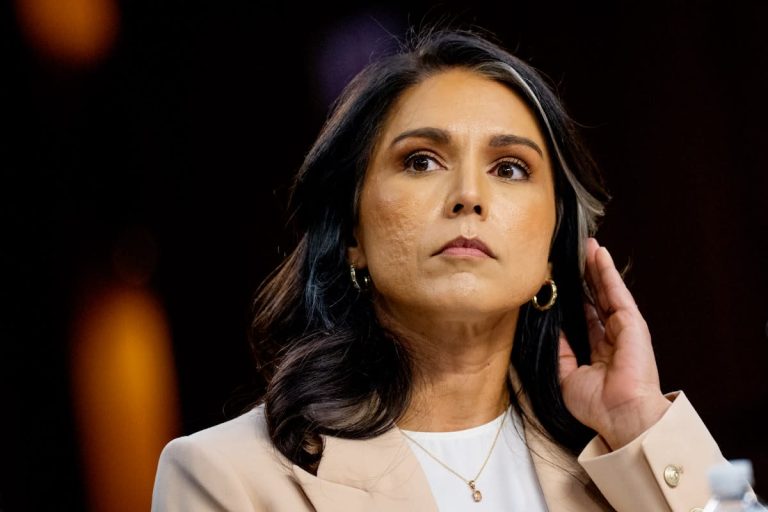Tulsi Gabbard Sidelined as Trump Administration Sharpens Iran and Israel Policy
WASHINGTON — Director of National Intelligence Tulsi Gabbard, once a vocal critic of U.S. military interventions and now a key figure in the Trump administration, appears to have lost influence in internal deliberations over potential military action against Iran, according to multiple senior officials familiar with the situation.
Although Gabbard’s allies acknowledge some tensions with the White House, they argue the friction has been exaggerated. None of them believe she’s at risk of resigning over the president’s Iran strategy — even if that includes direct military engagement.
Signs of Gabbard’s political isolation became clear this week after President Trump publicly contradicted her March testimony to Congress, in which she said the U.S. intelligence community had no evidence Iran was actively building a nuclear weapon. That stance clashed with Trump’s recent claims about an imminent Iranian nuclear threat.
“I don’t care what she said. I think they were very close to having one,” Trump told reporters aboard Air Force One on Tuesday.
However, a source familiar with U.S. intelligence assessments told NBC News that there has been no change in the community’s position since Gabbard’s testimony.
Trump’s open rebuke of his top intelligence official immediately sparked questions about whether Gabbard has been pushed to the sidelines on one of the administration’s most urgent foreign policy challenges.
The incident also highlights a growing ideological divide within Trump’s MAGA coalition, where some members are pressing for unwavering support of Israeli military action, while others — including Gabbard — argue such moves contradict Trump’s “America First” philosophy and his promise to avoid endless wars.
Multiple administration officials confirmed that Gabbard has been excluded from internal discussions concerning the escalating conflict between Israel and Iran. Even two of her allies acknowledged that her political capital took a hit after she posted a controversial video on June 10, following a visit to Hiroshima. The video, which included simulated images of American cities destroyed by nuclear war, was meant to underscore the dangers of escalation but reportedly frustrated White House insiders.
Gabbard was also notably absent from a high-level Camp David meeting on June 8, where senior officials gathered to discuss U.S. strategy on Israel and Iran. A White House spokesperson said she missed the meeting due to a prior commitment to National Guard training.
Her past views on Iran and her recent messaging have complicated her role within the administration. Gabbard has at times appeared to contradict the official White House line, though sources say her differences haven’t risen to the level of being forced out.
“Tulsi is a veteran, a patriot, a loyal supporter of President Trump, and a critical part of the coalition he built in 2024,” Vice President JD Vance said Tuesday. “She’s an essential member of our national security team, and we’re grateful for her tireless work to keep America safe.”
Still, not all Republicans are defending her. “She obviously needs to change her meds,” Sen. John Kennedy (R-La.) told Jewish Insider last week, referencing her recent Iran remarks.
Behind the scenes, Gabbard has reportedly been working to promote diplomacy, including outreach to European allies who maintain back channels to Tehran, according to one official.
That approach stands in contrast to Trump’s more aggressive rhetoric. “I may do it. I may not do it. I mean, nobody knows what I’m going to do,” he said Wednesday, referring to the possibility of U.S. military involvement in the Iran-Israel conflict.
Gabbard’s allies concede that the Hiroshima video caused frustration inside the West Wing but insist the fallout has been overstated.
“I’ve heard the video ruffled feathers,” one ally said. “But I don’t believe the president himself was upset. I’m told the matter is resolved.”
They also pushed back on speculation that Gabbard would resign if Trump moved forward with a military operation. “The online claim that she will resign if the president decides to take direct action in Iran is false,” one person close to her said.
Still, the video circulated widely among Trump’s senior aides and raised eyebrows over why Gabbard would take such a public stance at a time of rising tensions.
“She’s still in decent standing,” said a GOP operative familiar with White House dynamics. “But moments like this allow more traditional hawks and neoconservatives to try and minimize her influence.”
Asked about the Hiroshima video, Gabbard’s deputy chief of staff, Alexa Henning, defended it: “Acknowledging the past is critical to informing the future. President Trump himself has warned of the catastrophic consequences of nuclear war, which is why Tulsi continues to advocate for peace.”
As a former Democratic congresswoman and 2024 Trump campaign surrogate, Gabbard built her political identity around opposition to U.S. military entanglements abroad — including in Iraq, Afghanistan, Libya, and Syria. During last year’s campaign, she accused President Biden of bringing the country “closer to nuclear war than we’ve ever been before.”
Even during Trump’s first term, she criticized his withdrawal from the 2015 Iran nuclear agreement, which had placed constraints on Tehran’s nuclear ambitions in exchange for sanctions relief.
If Trump were to authorize military strikes against Iran — especially amid reports that Israel views such action as potentially regime-ending — Gabbard would find herself in a politically untenable position. She has long vowed to prevent the U.S. from engaging in regime change wars.
Her entrance into Trump’s MAGA base was initially seen as a sign of ideological diversity and her anti-interventionist views were welcomed by parts of the coalition. But now, that same ideological distance is isolating her as the administration moves toward a more aggressive posture.
As one senior official put it: “If you adopt a Chihuahua, you shouldn’t be surprised when it barks like a Chihuahua.”

